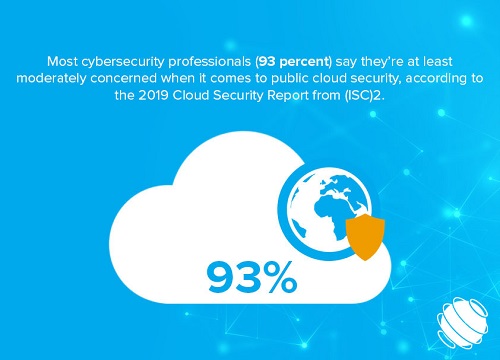
Although the cloud is relatively safe, 28 percent of organizations report experiencing a cloud security incident during the past year, with data exposure being the most common kind of occurrence, (ISC)2 reports.
Just as it’s vital to proactively safeguard on-premise and traditional IT infrastructure, companies must take steps to ensure their data is properly secured against hacking and data breaches in the cloud. Here’s what every business leader should know about protecting sensitive information in the cloud.
The Cloud versus Traditional IT Systems
Storing your data via public cloud solution providers like Google Cloud Platform, Amazon Web Services (AWS) and Microsoft Azure is actually “probably more secure than conventionally stored data,” according to The New York Times “Ask the Times” column “’Where Does Cloud Storage Really Reside? And Is It Secure?’”
In the column, Quentin Hardy, the Times’s deputy technology editor, states that it’s usually safer to have your data stored on the servers of a cloud vendor than it is to have it on your own server for the same reason that your money is better off in the bank than stashed in your mattress. Public cloud providers usually have cybersecurity professionals and top tech experts working for them to ensure their clients’ data stays safe.
Although giving up direct control of data to a cloud provider might make you worry, cloud servers are heavily safeguarded and are indeed more secure than on-site storage in most cases, according to the Malwarebytes blog entry “Should you store your data in the cloud?”
However, it’s important to know that cloud security – while robust – isn’t completely immune to hackers and breaches, Malwarebytes states.
Cybersecurity Considerations for Choosing a Cloud Provider
To minimize your risk level, you should keep the following factors in mind while selecting a cloud solution provider.
1. Know what your security and compliance requirements are for the data/workloads you plan to move to the cloud. This is a best practice for a solid cloud security strategy, according to the TechTarget article “Clouds are more secure than traditional IT systems – and here’s why.”
2. Research the cloud solution provider and find out what cybersecurity measures they have in place. You’re still ultimately responsible for making sure your data is properly protected against security threats, especially if you must comply with regulations like HIPAA. An IT managed service provider can implement third party vendor risk management solutions to address this concern.
3. Partner with a team of cloud consultants to help you evaluate your options. Our team of expert cloud consultants can save you time and money by taking care of the shopping around process for you. With cutting edge tools and a portfolio of more than 200 cloud solutions, we have the experience and insight needed to identify offerings that fit your unique needs.
Additionally, due to our price parity guarantee, our trusted advisor services won’t come at a higher cost than going directly to the vendor. To learn more, contact us today by calling 877-599-3999 or emailing sales@stratospherenetworks.com.
Overall, a comprehensive approach to IT security is essential, whether you’re working in the cloud or on-premise. Take proactive steps to minimize the risk of a data breach and keep sensitive information out of the hands of hackers.


